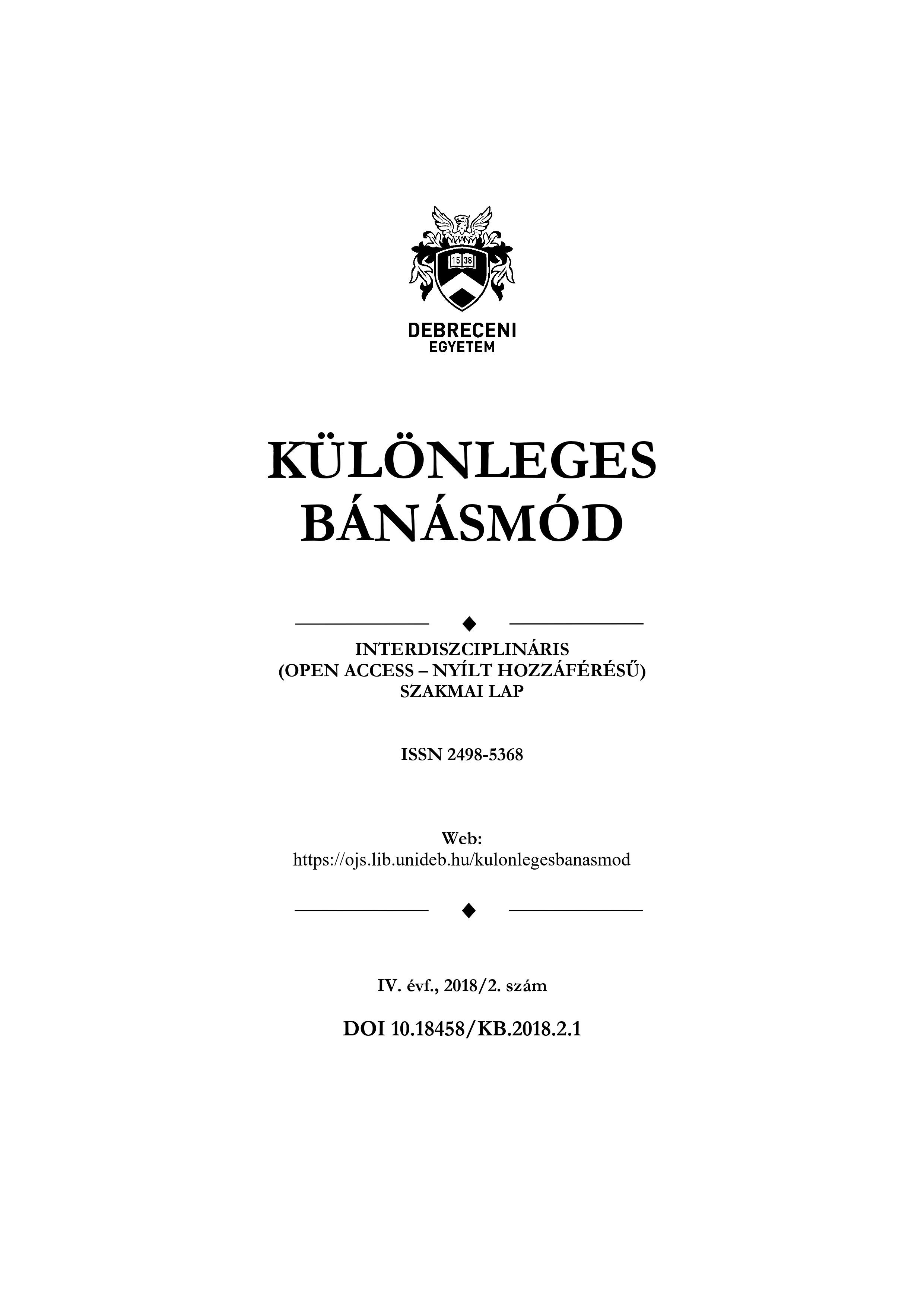Vol. 4 No. 2 (2018)
##issue.tableOfContents##
Articles
-
SPECIAL TREATMENT, 2018. Vol. 4. (2.)
1-98Views:324Special Treatment, 2018. Vol. 4. (2.) - full text
PDF (Hungarian)311
Methodological Studies
-
EXAMINING OF A SAMPLE LESSON OF A NEW GENERATIONAL HISTORY SCHOOL BOOK FROM THE VIEWPOINT OF THE IPOO MODEL
7-16Views:186Textbooks are essential teaching tools in the teaching-learning process in certain subjects. This study examines whether a newly developed national history textbook’s sample chapter can meet the requirements of the learning stages outlined in the learning model of IPOO, and makes suggestions for the effective use of the chosen textbook through History lessons.
PDF (Hungarian)163 -
THE OPPORTUNITY OF THE CHOICE IN THE DATA COLLECTION PHASE OF LEARNING AND IN THE ORGANIZATION OF LEARNING - A PRESENTMENT OF ALTERNATIVE SCHOOL PRACTICES BASED ON THE IPOO-MODEL
17-26Views:207In this article, some alternative school practices are presented, focusing on the choices of students during the information gathering phase of learning, including the topic selection and resource research as well as the learning organization phase. Learning phases are interpreted according to IPOO-model. After the introduction of the practices, we propose some solutions that will provide students with similar choices in the traditional school environment.
PDF (Hungarian)204 -
MUSEUM PEDAGOGICAL WORKSHOP IN THE LIGHT OF THE IPOO-MODEL
27-35Views:207With the spread of the visitor-friendly museum approach the professionals of the museum strive to address a visitor layer as wide as possible. It requires the professional interpretation of exhibitions for different ages. Thus, both the role of museum pedagogues and the museums as non-formal education space are appreciated increasingly. However, the nature of an exhibition also may be influenced in certain cases by the structure of the exhibition space. The Literature House of Debrecen is a long straight space divided into five smaller units, in which the permanent literature exhibition of Dreaming Hungarians can be found. The periodical exhibition with the title of ’REJTŐzködő Irodalom’ appeared in this space in a scattered way. The character of the exhibition space provided an excellent possibility for a mosaic layout and in this way for a gamified museum pedagogical activity. In our study, this method is examined in the light of the IPOO-model. The aim of the method is how to make the learning more efficient and it can also be used in an excellent way in the non-formal education environment where learning covers the presence of pieces of information conveyed by the exhibition.
PDF (Hungarian)132 -
INTERPRETATIONAL POSSIBILITIES OF M-LEARNING WITH THE HELP OF THE IPOO MODEL
37-43Views:169Technological changes have created a high level of internet penetration and also the access to information that is less limited nowadays compared to earlier times, through the possession of portable online devices. These changes make it necessary to think about the process of teaching and learning, as well as the content, the means, and methods of it. In this paper review not only the features of the online learning environment created by the processes mentioned above but also its possible role in understanding learning as an information processing procedure. The focus of research is the analysis of the m-learning IPOO-model.
PDF (Hungarian)144 -
ABOUT EFFECTS OF MINDFULNESS BASED STRESS REDUCTION (MBSR) FROM ASPECTS OF IPOO-MODEL
45-54Views:306The aim of this study is to show the effects of Mindfulness-Based Stress Reduction from the viewpoint of the IPOO-model.
PDF (Hungarian)434 -
ABILITY DEVELOPMENT GAMES FROM ASPECTS OF IPOO-MODELL: THE POSSIBILITY OF DIAGNOSTICS INTEGRATED IN DEVELOPMENT
55-66Views:3519According to Mező's IPOO-model of learning, learning is a kind of information processing, which has got four different, but a related component. These components are input, process, output, and organization. This model is useable to analyzing and to diagnostic and to develop a wide range of learning phenomenons (from personality development to the development of learning strategies and abilities). The present study gives a short summarize of possibilities of ability diagnostics and development in the theoretical frame of the IPOO-model.
PDF (Hungarian)605
Workshop descriptions
-
INNOVATION PORTFOLIOS OF AN INNOVATION CLUB
69-76Views:410The Innovation Club of the Hungarian K+F Studio Ltd. is a special talent development program for young adults, which program was realized in the frame of a project of National Talent Program (project code is NTP-PKTF-17-0017). One of the results of this program project is an e-book, which contains young adults' (n=42) innovational portfolios. This article summarizes the experiences of this program and book.
PDF (Hungarian)121
Book Reviews
-
PRESENTATION OF THE "PREPARATION (TOGETHER) TO THE CHALLENGES OF THE 21ST CENTURY ” ENTITLED BOOK
79-82Views:388Presentation of the "Preparation (together) to the Challenges of the 21st Century ” entitled book.
PDF (Hungarian)134
Event Reports
-
III. INTERNATIONAL INTERDISCIPLINARY CONFERENCE
83-87Views:343III. INTERNATIONAL INTERDISCIPLINARY CONFERENCE
PDF (Hungarian)100 -
REPORT ABOUT THE "IN THE FOCUS IS: THE INNOVATION" CONFERENCE
89Views:291REPORT ABOUT THE "IN THE FOCUS IS: THE INNOVATION" CONFERENCE

